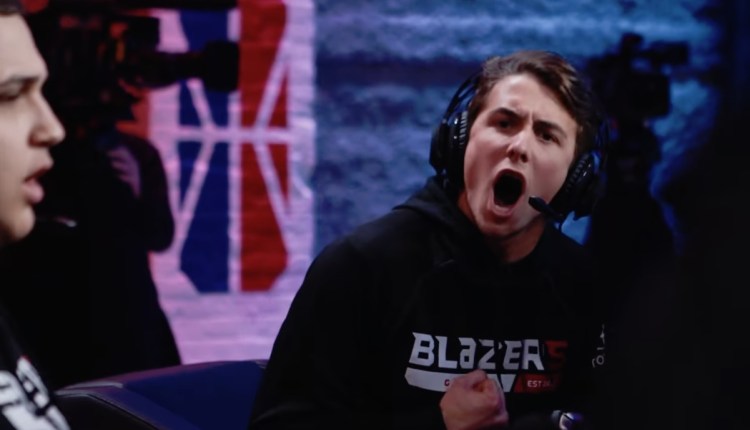The inaugural season of the NBA 2K League was a success by most measures. When it culminated in August, the esports series had more than 152 million video views across all social media platforms, and the league’s 17 teams had more than 1.8 million combined followers.
It helps that this video game esport has an analog in the real world, with established fans for the NBA franchises that compete both on the real hardwood and the virtual court. That makes the game more accessible than a lot of other esports, according to Brendan Donohue, the managing director of the NBA 2K League.
I moderated a chat with Donohue last week at the Esports BAR Miami event. We talked about the success of the first season, the support for the league from brands, and the roadmap for the future. Donohue has ambitious plans — including improving the number of female athletes and viewers, along with expanding the league to places, such as China. The league, which is a joint venture between the NBA and Take-Two Interactive, aims to be one of the biggest global esports.
Here’s an edited transcript of our interview.
June 5th: The AI Audit in NYC
Join us next week in NYC to engage with top executive leaders, delving into strategies for auditing AI models to ensure fairness, optimal performance, and ethical compliance across diverse organizations. Secure your attendance for this exclusive invite-only event.
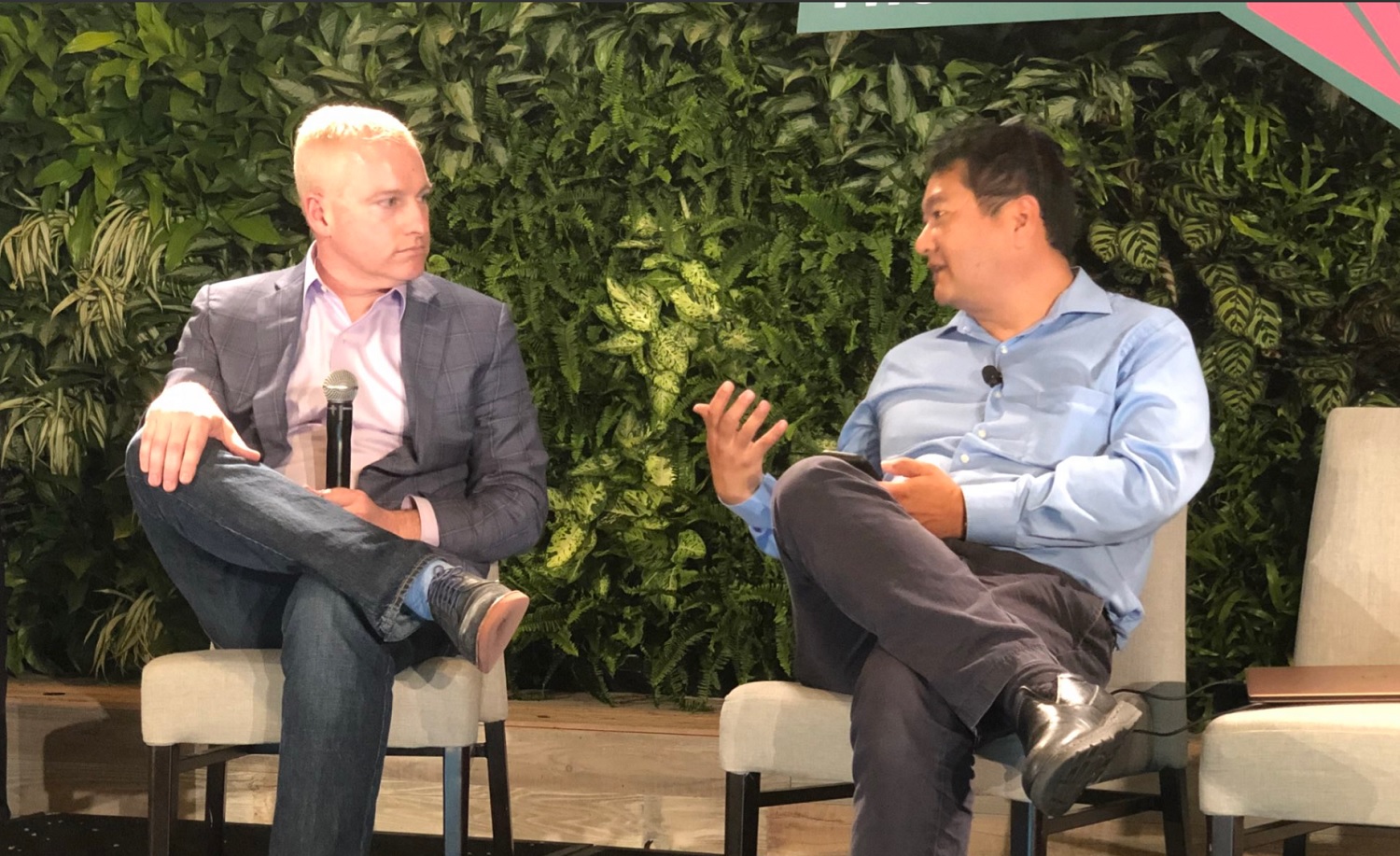
Above: Brendan Donohue of NBA 2K Esports and Dean Takahashi at Esports BAR MIami.
Brendan Donohue: I’ve been in the NBA in one form or another for 22 years. I was on the team side for 12 years, and I came into the NBA league office about 10 years ago. I took on this opportunity about 17 months ago.
GamesBeat: You made the switch from the traditional sport to esports. What convinced you? Was there a moment in time that struck you, that esports is the future?
Donohue: I guess it’s two different questions there. The thing that convinced me that this is a huge deal — this past January, we had our tryouts. Our tryouts are open. You could try out for the league from your home. We were working with 2K around what we could expect as far as the number of people who would make it through. We called it our combine, our final tryout. We expected 10,000 people might make it through. That’s what the data suggested from past behavior.
We got to February 1, and 72,000 people qualified for our combine. That was our moment. I mean, it’s a great problem to have. It showed how engaged people were. The international makeup of our 72,000 was interesting, too. In general, it was a positive sign.
GamesBeat: Could you describe how the NBA 2K league works and how things played out in your first season?
Donohue: We’re unique in traditional sports games crossing over into esports insofar as we’re five on five. There’s no AI involved in the game. In year one, we had 17 teams, NBA-owned teams involved in the league. For year two, we’re adding four more teams. We have 21 teams in year two, more than two-thirds of the league, which is very exciting. Similar to Overwatch, we have a market-specific setup. Our 17 teams in year one were based in their cities, no different from an NBA team. Based on the NBA model, we thought that was the best route to go.
GamesBeat: How were the results in terms of viewership and things like that?
Donohue: It was great. We had to create awareness of exactly what we were doing at the outset. That was our initial challenge. But the good news is we had consistent growth week after week. Our finals, we actually had 650,000 unique viewers watching a two-and-a-half hour broadcast. That far exceeded our expectations. Now, we’re building on top of that going into year two.
The other thing we’re encouraged by is the growth around our international audience. No different from the NBA, we have a global sport. In fact, I was just in Asia 10 days ago, and the amount of interest in the league there — we expect to grow beyond just NBA teams. We expect to have franchises all over the globe. We see having a Shanghai or London team playing Knicks Gaming. That’s our vision.
GamesBeat: The NBA 2K video game sold more than 10 million copies this year. You have this great advantage of, everyone knows the NBA. When you introduce this esport, the awareness is there. The teams are pouring marketing money into it. On the other hand, there are challenges in making a spectator sport out of a video game where the real thing is also a spectator sport. Can you talk about some of that?
Donohue: We don’t view it as a challenge as much as an opportunity. We think we have three distinct audiences. We have 2K players. As you mentioned, 10 million people play the console version. There’s an online version of the game that more than 30 million people play across the world. That’s another version. Then, we have NBA fans. Globally, we have 1.5 billion social followers of the NBA. And then, we have esports enthusiasts. That’s one of the reasons we thought partnering with Twitch made a lot of sense. We’ve been happy with the amount of folks on Twitch, esports enthusiasts, who are crossing over and giving us a try.
While certainly there is a real-life NBA game that exists, our advantage, we think, is that basketball is a globally recognizable game. That gives us an advantage with casual fans, which is unique. It also makes our partners very comfortable getting involved.
GamesBeat: Were there some interesting decisions you had to make early on in setting up the league?
Donohue: The one thing we decided to early on — Ben [Spoont of Misfits Gaming] mentioned this a bit in his discussion. It’s the importance of helping players manage the transition into esports. The NBA has a rookie transition program that helps players transition from college into the NBA ranks. We instituted the same thing. We have a 2K League rookie transition program where we teach players about the importance of culture, social media training, regular media training, living a balanced lifestyle, where that’s sleep or nutrition — all the things we teach our rookie players, we’ve learned from the NBA. We’re going to double down on that. We’re going to continue to give more of that guidance to help our players be successful.
GamesBeat: What do you notice that’s different about the audience — and the sponsors going after that audience — compared to the traditional sport?
Donohue: When we’re in meetings talking to potential partners, if they start talking about buying an audience, we tell them, “This is not necessarily the space for you.” We coach against that. You have to add value in some way, whether it’s to the audience or the players or the experience. You have to bring that to the table. We’ve lucked out in that we have great relationships with our NBA partners. 2K has many partners as well. That gives us an advantage. But still, we went through the same process of education and explaining what exactly we’re doing with all of our partners.

Above: NBA 2K esports.
GamesBeat: What’s your view of where esports is heading?
Donohue: You look out at the people here in Miami gravitating around the space, I think it’s a pretty good sign. What I love about esports so far is that, whether you’re talking to Overwatch or League of Legends or any other, I think we collectively root for each other. We understand that there is so much growth happening that there’s enough space for all of us to be successful. There’s a great opportunity for all of us.
Something the NBA prides itself on among all 30 teams is learning from each other and figuring out what best practices work. It’s the same here. How do we translate our studio into broadcast? What can we share with each other? How are you managing players in their transitions? All of these things. We’re all learning on the fly with each other. That’s why I think these conferences are so important. We can spend time together, share, and figure out what’s working and what’s not working.
GamesBeat: What do you think you’re learning from the NBA and learning to do differently from the NBA?
Donohue: I don’t know about different? What we’re learning from esports is about the interactivity of the broadcast. Twitch has helped us understand that this is not an audience you’re speaking to. This is a great engagement opportunity.
If you looked at our broadcast in week one and then looked at the finals, they didn’t even look like the same sport. It completely changed. A lot of that was from us, week after week, testing new things and getting immediate feedback from the Twitch chat and making adjustments. What was really interesting — for example, we changed from the NBA broadcast view to the 2K Cam, behind the point guard, from the view. That was based on feedback we got in the Twitch chat. When we made that adjustment, fans freaked out. They were so psyched that we listened to them.
Then, we doubled down. They wanted player camera views, so each individual player had their own camera on them. It all started to snowball. The fans got the feeling that we were really listening to them. While we’re excited to bring certain broadcast best practices in from the NBA, I think this idea of a totally customized broadcast is the future of consumption. We’ve learned a ton around that from esports more broadly.
GamesBeat: I know a company called Genvid has been talking about a technology to allow viewers to choose these different camera angles more easily. Maybe you could broadcast different ads to players based on what they’re watching and what you know about them. Does that sound like a logical end?
Donohue: I think it’s going to be on the continuum. I don’t know if there’s a logical end so much as we’ll just continue to iterate and make changes and be as customizable as possible. It’s not so far off that we’ll be offering the opportunity to choose who your announcer is, who your broadcast team is, what you want to see. It could be an influencer. It could be an NBA legend. It could be any number of people. Any chance we get to offer an audience something they want to hear in their own language, that benefits our engagement chances.
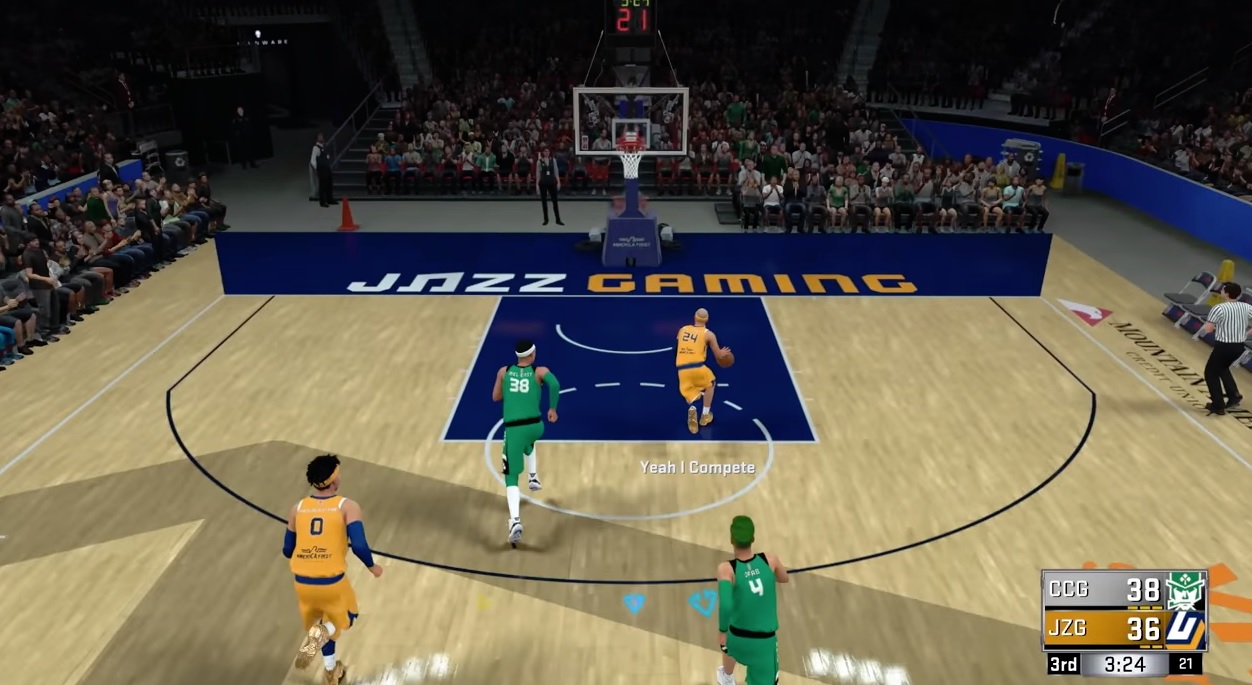
Above: NBA 2K esports.
GamesBeat: What if the NBA objects to that? What if they say, “Well, we have these traditional famous broadcasters and everybody should see them?”
Donohue: The biggest benefit I have, and one of the reasons I took this role, is I have one of the most innovative bosses in the sports industry. Adam Silver is as innovative as you’re going to find. He loves the NBA 2K League. He’s been in the studio. He’s very actively following us. I benefit from having someone who gets it. I don’t have to worry about that issue.
GamesBeat: Spoont talked about how, when he was growing up, he watched games and [went] outside and [tried] to learn to shoot better. Some of the people watching this may be spectators of the esports and then go to their console and figure out how to be a better NBA 2K player. It’s a different phenomenon going on.
Donohue: It’s another branch for us. It’s important, though, for us to make clear that this is a distinct league. This is not a marketing mechanism for us to promote the NBA. This is a distinct league, and we truly believe that. It might be anecdotal, but my own son, who’s now 12 — when he was eight years old he knew who Steph Curry was, who NBA players were, from playing 2K. He wasn’t able to stay up late enough to watch games on TV, but he got his knowledge from playing the video game.
We think there’s plenty of opportunity for us to engage people who aren’t interested in basketball. And in terms of the activity level, what we loved seeing early on — whether it’s in Miami or Utah or New York, our players, they’re waking up in the morning as a team. They’re going to the gym together. They’re going to watch film for a couple of hours. They have practice. They have a very balanced day, no different from their NBA counterparts. That’s one thing we’re glad to see that the NBA teams have instilled and carried over from the traditional league.
GamesBeat: Spoont asked you a question at the very end of his session. How are you going to make money for team owners like him?
Donohue: The thing we’re focused on — our NBA owners are very innovative by nature. They, in many ways, led us into this. While they’re extremely bullish on the 2K League, as people across other titles know, NBA owners are involved in Overwatch League. They’re involved in the League of Legends Championship Series. They’re very involved in the broader esports landscape.
What we’re focused on right now is scale. We want to become a global league. We want teams overseas. We think this could potentially be a 45-team league. That’s our future. Our owners are focused on growth and scale, not necessarily immediate revenue.
Question: Do you think that the leagues overseas will come from teams and leagues in the traditional sport, organizations that already have some links with the NBA, or will they be esports organizations coming in to be involved with the league?
Donohue: We see a day where non-NBA owners are coming into the 2K League and buying franchises. That’s a goal. We have 13 offices around the world. We already have deep relationships in many markets, well-developed relationships we could use.
Europe is a big part of our expansion picture. Certainly, there will be opportunities for non-NBA owners to get involved in owning a franchise in the 2K League. The ownership vetting process will be open to both esports organizations and traditional sports organizations.
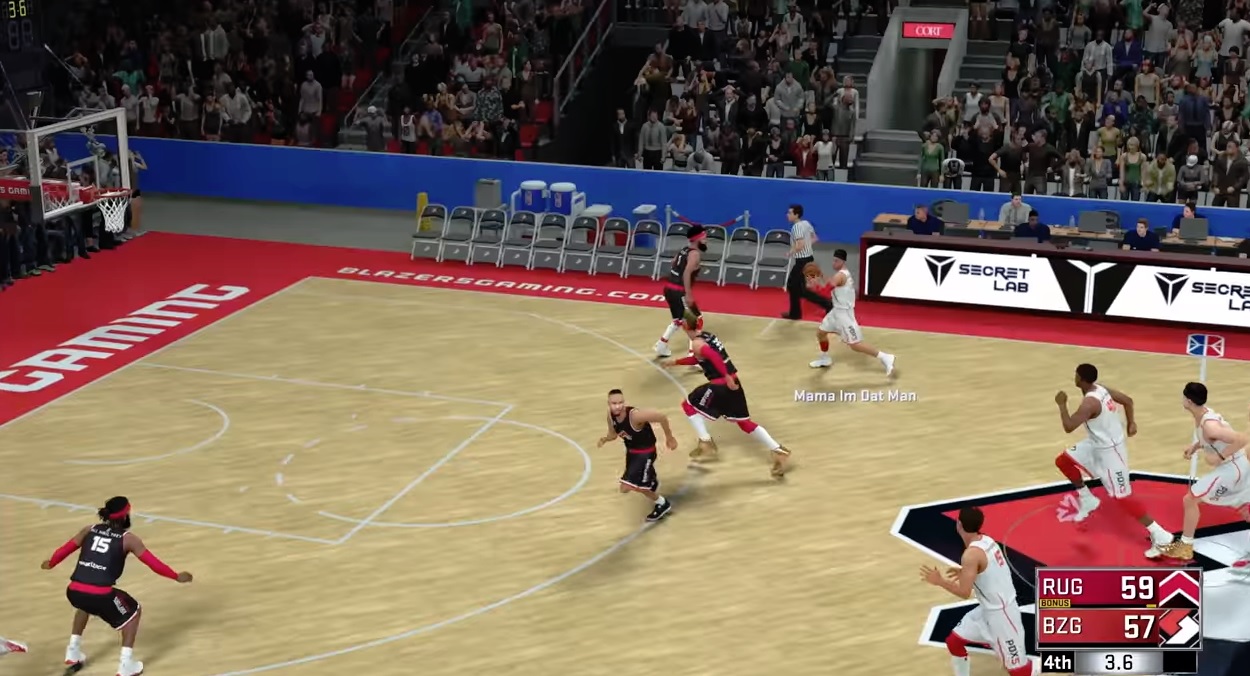
Above: NBA 2K esports.
Question: What’s your perspective on short- and long-term distribution deals? Normally, NBA league rights are handled through League Pass or potentially international partners. How do you see that playing out in esports? Where will the content be distributed one year out, five years out, and further?
Donohue: Any type of long-term discussion is really tough when a league is so new. We have great relationships, obviously, with Twitch on the streaming end. I do think we have — given that we have a unique ability to attract a casual audience, linear [television] could make sense in some way, whether it’s a game of the week or some sort of magazine show. All of those things could potentially work. But our biggest thing is looking to — there’s native-language programming we could do. I truly believe we’re just scratching the surface as this point.
We have the advantage of being the NBA esport. We have a unique ability to grow in a thoughtful way. I think we’ll continue to see streaming around the world. The type of content could vary. It’s no different from who we are on the NBA side. Growing globally is going to give us plenty of distribution opportunities.
Question: Do you see content ever going behind a paywall in esports?
Donohue: Potentially? If you have VIP access to certain behind the scenes — there’s always that potential, no different from any other content.
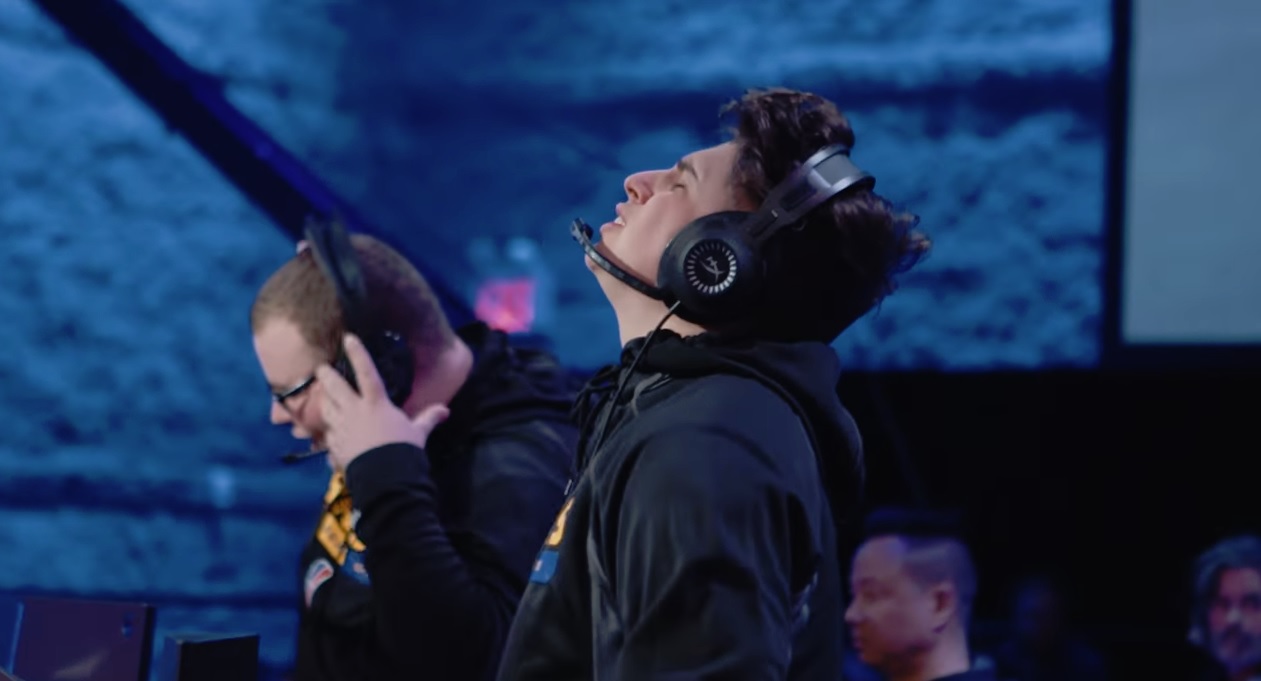
Above: The agony of defeat.
GamesBeat: Talking about going after a broader audience, especially women, the NBA has a pretty even gender spread, but esports doesn’t. How do you think you can get more women watching?
Donohue: We’ve been very focused on diversification in our player pool. We have nine international players in the league right now. We have no women right now, and that was a big disappointment for us. We didn’t know gender in the tryout process until the very end, and so, we got to the final 250, and we found we had one woman in the 250. She didn’t make it to the 102.
We immediately went into — this is where Adam is terrific. We immediately started an initiative to discover, are there any barriers to entry we need to remove? We have a task group that’s made up of executives around 2K, 2K League, and the NBA, and, in addition, we’ve developed close relationships with the top women 2K players. We’ve had a focus group with them to find out what their experience was. We think there’s an excellent opportunity for us to diversify our player pool as early as season two, and we’re very focused on that.
Disclosure: The organizers of Esports BAR Miami paid my way to the event, where I moderated a couple of sessions. Our coverage remains objective.
